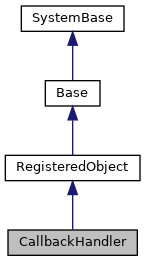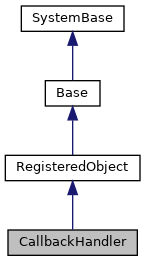

Public Member Functions | |
| _.Library.String | evaluate (Args) |
| Evaluate receives a variable number of arguments, allowing you to pass multiple arguments on the evaluate. More... | |
 Public Member Functions inherited from RegisteredObject Public Member Functions inherited from RegisteredObject | |
| _.Library.Status | OnAddToSaveSet (_.Library.Integer depth, _.Library.Integer insert, _.Library.Integer callcount) |
| This callback method is invoked when the current object is added to the SaveSet,. More... | |
| _.Library.Status | OnClose () |
| This callback method is invoked by the <METHOD>Close</METHOD> method to. More... | |
| _.Library.Status | OnConstructClone (_.Library.RegisteredObject object, _.Library.Boolean deep, _.Library.String cloned) |
| This callback method is invoked by the <METHOD>ConstructClone</METHOD> method to. More... | |
| _.Library.Status | OnNew () |
| This callback method is invoked by the <METHOD>New</METHOD> method to. More... | |
| _.Library.Status | OnValidateObject () |
| This callback method is invoked by the <METHOD>ValidateObject</METHOD> method to. More... | |
Additional Inherited Members | |
 Static Public Attributes inherited from RegisteredObject Static Public Attributes inherited from RegisteredObject | |
| CAPTION = None | |
| Optional name used by the Form Wizard for a class when generating forms. More... | |
| JAVATYPE = None | |
| The Java type to be used when exported. | |
| PROPERTYVALIDATION = None | |
| This parameter controls the default validation behavior for the object. More... | |
For details on using this class, see Performing XSLT Transformations.
This class handles callbacks from the XSLT processor. You should create a subclass this class and override the 'evaluate' method to perform the processing that you require. An example of an stylesheet using this function is shown in the example XSL contained in the XML.XSLT.Transformer class
| _.Library.String evaluate | ( | Args | ) |
Evaluate receives a variable number of arguments, allowing you to pass multiple arguments on the evaluate.
call. The number of arguments is available in the Args variable and each value can be accessed by subscripting. The method has a single return value which will be returned as the result of the xslt evaluate function(). The return value can either be a regular cache variable or it can be an instance of a stream object. This allows for returning a value that is greater than 32k in size. The stream has to be wrapped in an instance of XML.XSLT.StreamAdapter which facilitates the XSLT processors reading of the stream. This example shows both techniques, change the 1 to 0 to test the stream functionality (XML.XSLT.Transformer.Example3() exercises this functionality)